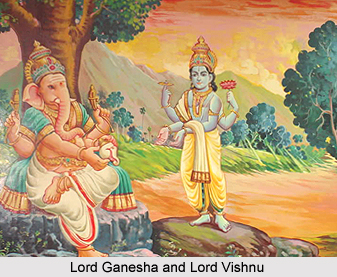 The legend related to the worship of Lord Ganesha by Lord Vishnu is mentioned in the Ganesha Purana which is exclusively devoted to Lord Ganesha. The myth states that Lord Brahma was the creator of the Universe and recited the Vedas. He emerged from the navel of Lord Vishnu and was seated over the lotus throne. While Lord Vishnu was resting over the serpent bed, 2 fierce asuras or demons named Madhu and Kaitabha were formed from the wax emerging out of the ears of Vishnu. These demons began to create obstructions for the gods, sages and humans. As an effect of this, Lord Vishnu woke up from his divine sleep and saw the commotion in heaven and earth.
The legend related to the worship of Lord Ganesha by Lord Vishnu is mentioned in the Ganesha Purana which is exclusively devoted to Lord Ganesha. The myth states that Lord Brahma was the creator of the Universe and recited the Vedas. He emerged from the navel of Lord Vishnu and was seated over the lotus throne. While Lord Vishnu was resting over the serpent bed, 2 fierce asuras or demons named Madhu and Kaitabha were formed from the wax emerging out of the ears of Vishnu. These demons began to create obstructions for the gods, sages and humans. As an effect of this, Lord Vishnu woke up from his divine sleep and saw the commotion in heaven and earth.
The Lord decided to eliminate the demons and remove the obstructions created by them. Thus he created a thundering sound with His divine Shankha or conch shell. The reverberating sound of the conch frightened the Universe. Then demons Madhu and Kaitabha attacked Vishnu at the same time. The deity fought against the asuras for a period of five thousand years but he failed to defeat them.
Then Lord Vishnu took the form of Gandharva, a beautiful musician deity. He began to play a veena after reaching a forest. All the animals in the forest started to dance at the tune of the divine music. Meanwhile, Lord Shiva also heard the music of Vishnu. Then Pushpadanta and Nikumbha also took the form of Gandharvas and reached the forest by following the music. They prayed to Lord Vishnu to go to Lord Shiva in Mount Kailash.
Vishnu then went to Kailash and bowed down at the feet of Lord Shiva. Shiva then welcomed and embraced Vishnu and offered him a seat. Lord Vishnu became gratified to consult with Shiva. Then Vishnu picked up the veena and began to play it. Lord Shiva, His consort Goddess Parvati, their sons Lord Ganesha and Lord Kartikeya (Skanda) and all other gods became overwhelmed with the divine music.
Pleased with Vishnu`s music, Lord Shiva granted him a boon. Vishnu requested the deity to help Him in eliminating the demons Madhu and Kaitabha as He himself failed to kill the asuras. Lord Shiva suggested Vishnu to worship Lord Ganesha before attempting to annihilate Madhu and Kaitabha. Lord Vishnu followed his advice and worshipped and prayed to Ganesha. Then Vishnu went to slay the demons and achieved success in his task. This the legend related to the worship of Ganesha by Lord Vishnu.









